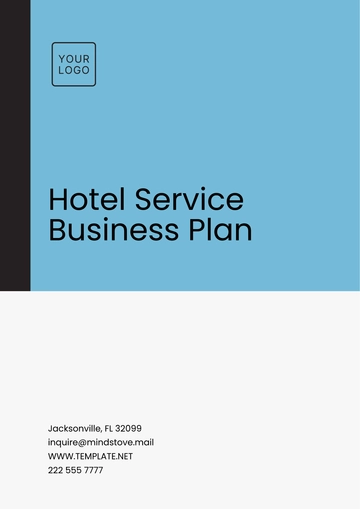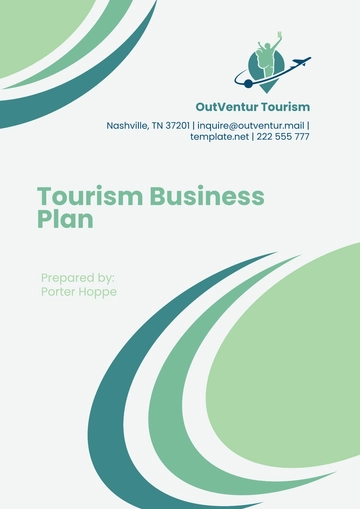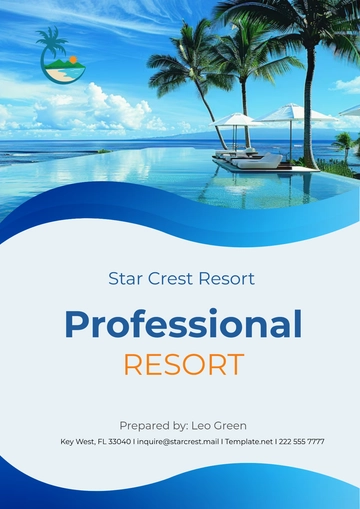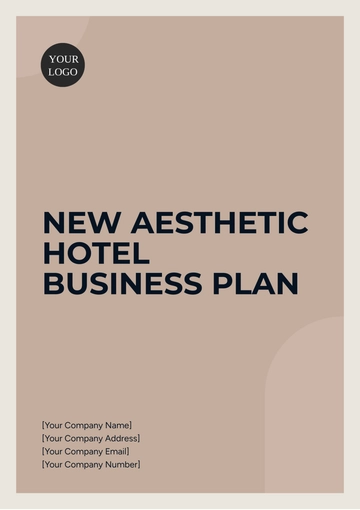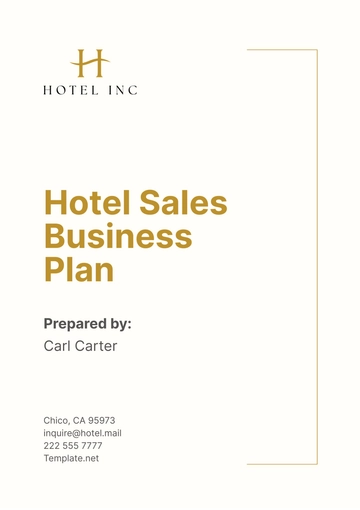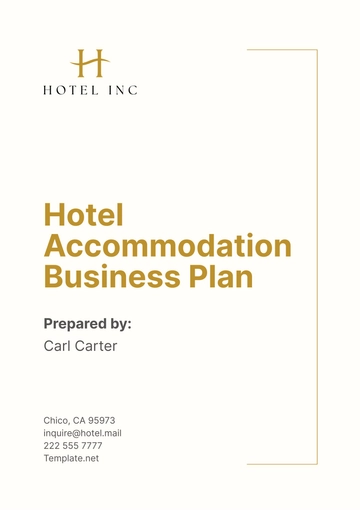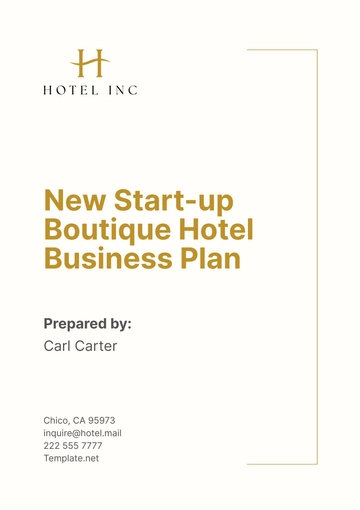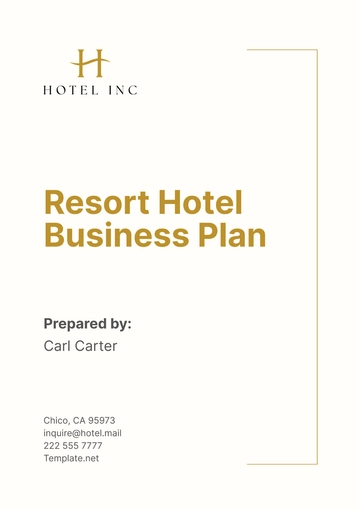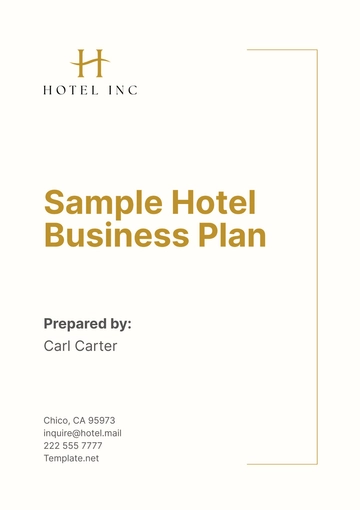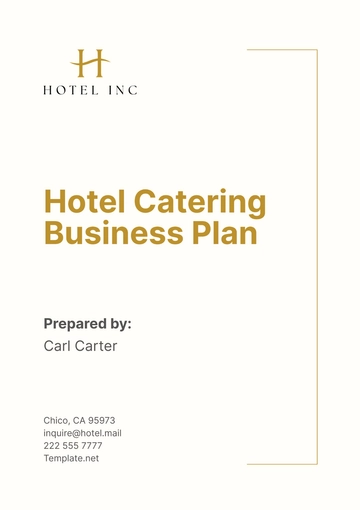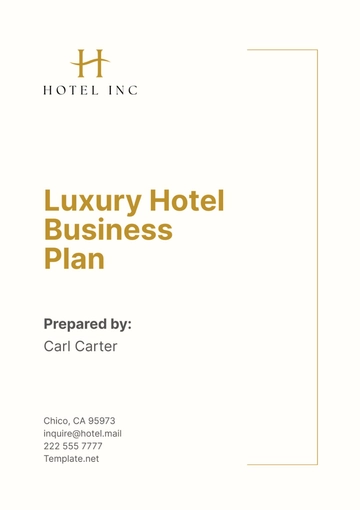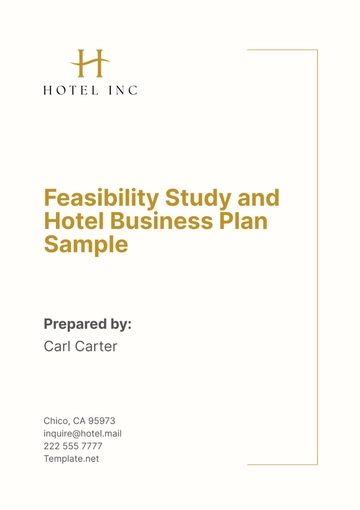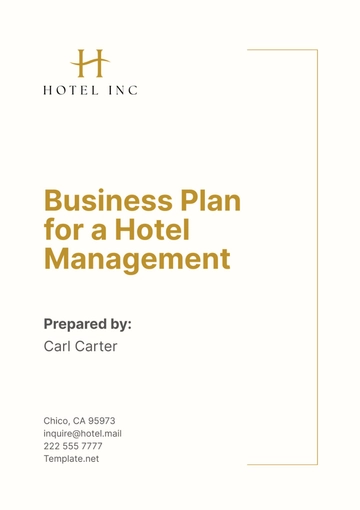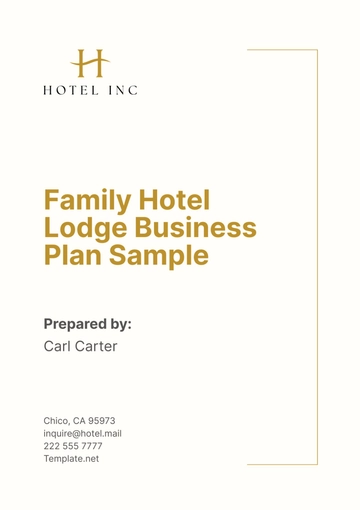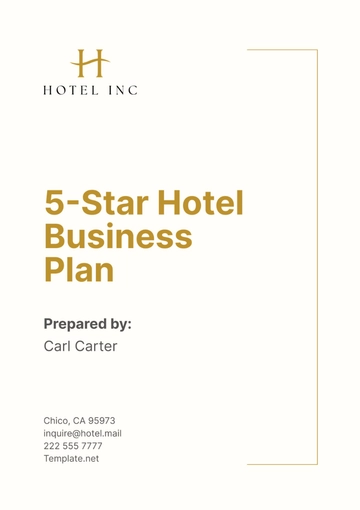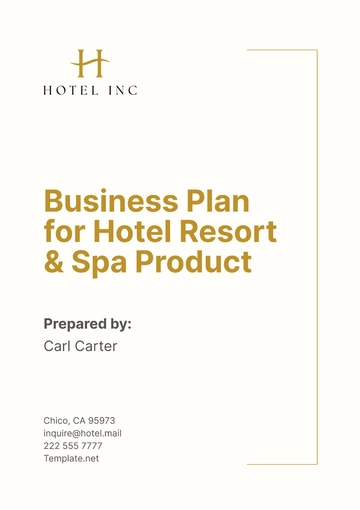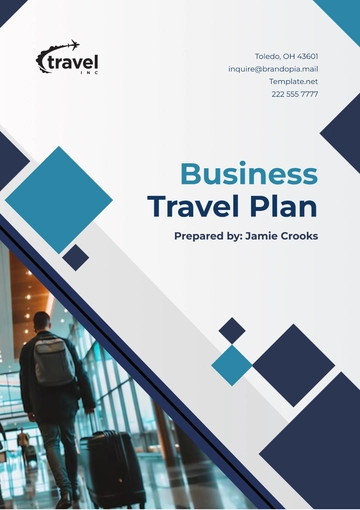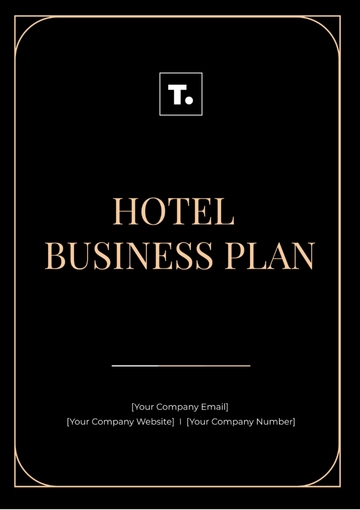Free Hotel Sales Business Plan
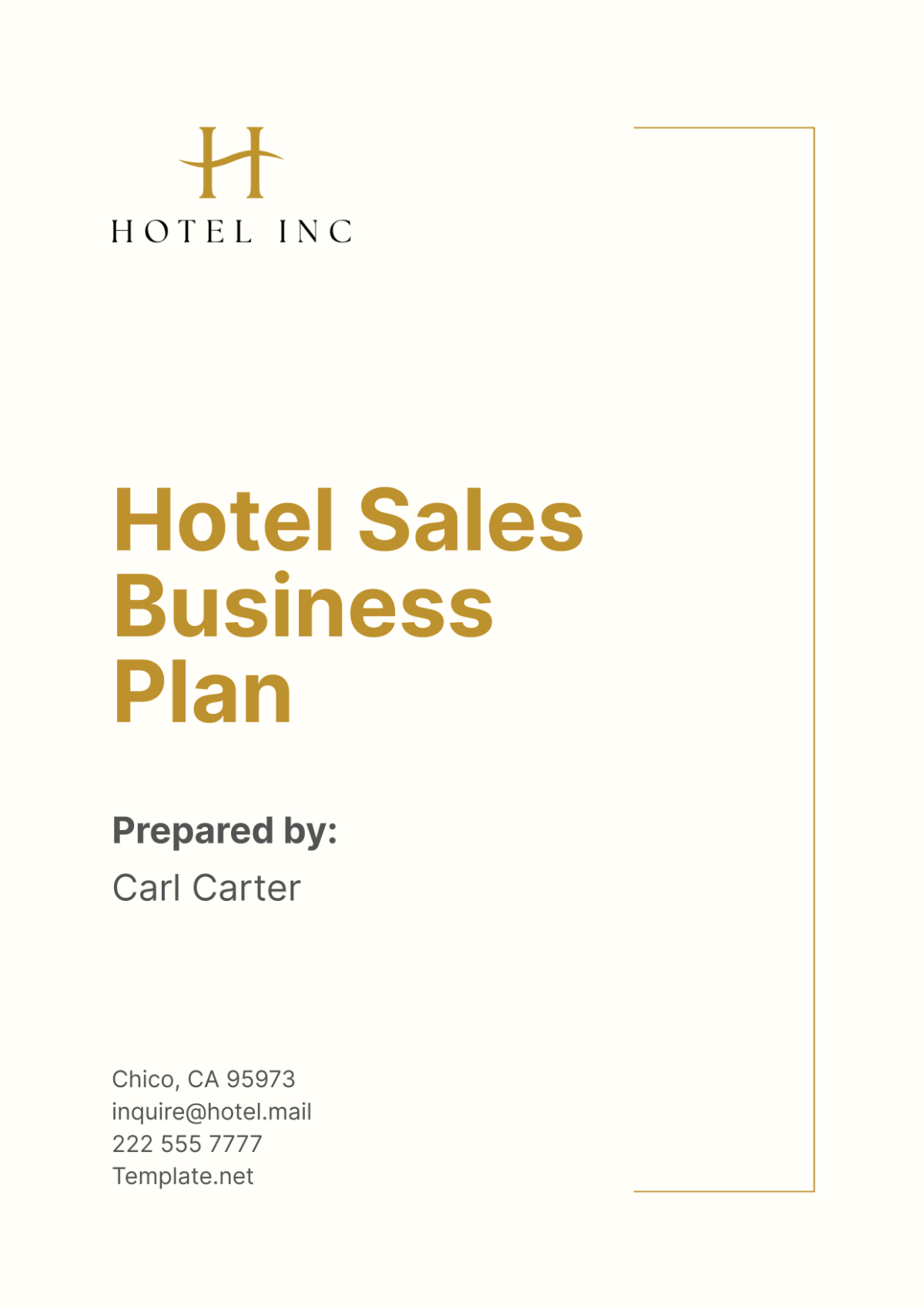
I. Executive Summary
[Your Company Name] is a premier hospitality business dedicated to providing high-quality lodging and exceptional customer service. Our business plan outlines a strategic approach to increase hotel sales and market share through effective marketing, targeted sales efforts, and operational efficiency enhancements. By leveraging modern marketing techniques and optimizing our operations, we aim to position [Your Company Name] as the top choice for both business and leisure travelers. Our goal is to create a seamless and memorable experience for our guests, ensuring high levels of satisfaction and loyalty.
This plan details our objectives, market analysis, sales strategy, marketing plan, operational plan, and financial projections. By aligning our marketing activities with our overall business goals, we aim to create a cohesive strategy that drives growth and enhances our competitive edge.
II. Company Description
A. Company Overview:
Company Name: [Your Company Name]
Established: [Year Established]
Address: [Your Company Address]
Phone Number: [Your Company Number]
Email: [Your Company Email]
Website: [Your Company Website]
Social Media: [Your Company Social Media]
[Your Company Name] was established in [Year Established] with a mission to provide luxurious accommodations and superb customer service. Located at [Your Company Address], our hotel offers a blend of modern amenities and classic elegance, making it the perfect choice for travelers seeking comfort and convenience. Our commitment to excellence has earned us a reputation for being a preferred destination for both leisure and business travelers.
B. Mission Statement:
Our mission is to provide an unforgettable lodging experience through luxurious accommodations, superb customer service, and a commitment to continuous improvement and excellence. We strive to create lasting memories for our guests by ensuring their utmost comfort and satisfaction. Our dedicated team works tirelessly to exceed expectations and deliver a personalized experience that caters to the unique needs of each guest.
III. Market Analysis
Conducting a thorough market analysis is essential for identifying our hotel's unique selling points, understanding the competitive landscape, and recognizing market trends. This section outlines our market research findings and how they will inform our marketing strategies. By gaining a deep understanding of the market, we can tailor our approach to meet the demands of our target audience and stay ahead of the competition.
A. Industry Overview:
The hospitality industry is a rapidly growing sector, driven by increasing demand for both business and leisure travel. In recent years, customer preferences have shifted towards unique and personalized experiences, with an emphasis on high-quality service and luxurious amenities. The competitive landscape is evolving, with many hotels leveraging digital marketing and advanced technologies to attract and retain guests.
The global hospitality market is expected to continue its growth trajectory, fueled by rising disposable incomes, increased travel spending, and a growing middle class. This presents a significant opportunity for [Your Company Name] to capitalize on the expanding market and attract a diverse range of travelers.
B. Target Market:
Our target market consists of three primary segments:
Business Travelers: Professionals seeking convenient and comfortable accommodations for their business trips. They value efficiency, accessibility, and high-speed internet connectivity. Our hotel’s proximity to business districts and conference facilities makes it an ideal choice for corporate clients.
Leisure Tourists: Individuals and families looking for a relaxing and enjoyable vacation experience. They prioritize amenities such as swimming pools, spa services, and recreational activities. Our hotel offers a range of amenities designed to cater to the needs of leisure travelers, ensuring a memorable stay.
Events and Conference Attendees: Organizers and participants of various events, including conferences, weddings, and corporate retreats. They require flexible event spaces, catering services, and professional event management. Our state-of-the-art conference facilities and experienced event planning team make us a preferred venue for large gatherings.
Market Segmentation Table
Segment | Demographics | Psychographics | Behavior |
|---|---|---|---|
Leisure Travelers | Families, couples, solo travelers, 25-55 | Value relaxation, recreation, unique experiences | Book vacations during holidays, weekends, peak seasons |
Business Travelers | Professionals, 30-60 | Prioritize convenience, efficiency, business amenities | Travel frequently for meetings, conferences, events |
Event Organizers | Event planners, 35-50 | Seek venues with comprehensive event services | Plan events well in advance, often during off-peak seasons |
C. Competitive Analysis:
Analyzing competitors allows us to identify gaps in their offerings that we can exploit to differentiate our hotel. Understanding our competition helps us to position [Your Company Name] effectively and create unique value propositions that appeal to our target audience.
Competitor | Strengths | Weaknesses | Opportunities | Threats |
|---|---|---|---|---|
Hotel A | High-quality service, luxury amenities | High pricing, limited family packages | Improve value-for-money offerings | Aggressive marketing campaigns |
Hotel B | Affordable pricing, good location | Inconsistent service quality, outdated decor | Modernize facilities, enhance service | Competitive pricing pressure |
Hotel C | Excellent customer reviews, strong brand | Limited event space, high occupancy rates | Expand event facilities | High customer expectations |
Hotel D | Diverse amenities, eco-friendly practices | Less online presence, outdated website | Enhance digital marketing efforts | Rising operational costs |
IV. Sales Strategy
Our sales strategy is designed to increase occupancy rates, boost the average daily rate (ADR), and enhance overall revenue. By leveraging our unique selling points and implementing targeted sales tactics, we aim to position [Your Company Name] as the preferred choice for both business and leisure travelers. This strategy will focus on developing partnerships, enhancing our online presence, and implementing a loyalty program to drive repeat bookings.
A. Sales Goals:
Occupancy Rates: Increase occupancy rates to 80% by the end of 2050. This will be achieved through targeted marketing efforts and strategic partnerships.
Average Daily Rate (ADR): Boost ADR to $200 by the end of 2050. We will focus on enhancing the guest experience and offering premium services that justify higher rates.
B. Key Sales Tactics:
Partnership Development:
Establish partnerships with travel agencies, corporate clients, and event planners to secure a steady stream of bookings.
Offer exclusive packages and discounts to partner organizations, encouraging them to choose [Your Company Name] for their lodging and event needs.
Digital Marketing:
Enhance our online presence through strategic SEO and digital marketing campaigns. By improving our website’s visibility on search engines, we can attract more organic traffic and increase direct bookings.
Utilize social media platforms to engage with potential guests and promote our services. Regular posts, advertisements, and interactive content will help build a strong online community and drive brand awareness.
Loyalty Program:
Implement a loyalty program to encourage repeat bookings and reward frequent guests with exclusive benefits and discounts. This program will foster customer loyalty and increase the likelihood of guests returning to [Your Company Name].
Sales Strategy Table
Sales Tactic | Description | Target |
|---|---|---|
Partnership Development | Establish partnerships with travel agencies, corporate clients, and event planners | Secure steady bookings |
Digital Marketing | Enhance online presence through SEO and social media campaigns | Increase direct bookings |
Loyalty Program | Implement a program to reward frequent guests with exclusive benefits and discounts | Foster customer loyalty |
By focusing on these key sales tactics, [Your Company Name] aims to achieve significant growth in occupancy rates and ADR, ultimately driving higher revenue and enhancing our competitive position in the market. These efforts will be supported by ongoing analysis and optimization to ensure maximum effectiveness and alignment with our overall business goals.
V. Marketing Plan
Our marketing plan is designed to increase brand awareness, attract new customer segments, and promote special packages and seasonal offers. By utilizing a mix of digital and traditional marketing channels, [Your Company Name] aims to reach a broad audience and drive bookings. This section outlines our marketing objectives, strategies, and channels to ensure a cohesive and effective marketing approach.
A. Marketing Objectives:
Increase Brand Awareness:
Enhance the visibility of [Your Company Name] across various marketing channels to ensure potential guests recognize and remember our brand.
Utilize consistent branding and messaging to build a strong brand identity.
Attract New Customer Segments:
Identify and target new customer segments, including younger travelers and international tourists.
Develop tailored marketing campaigns to address the specific needs and preferences of these segments.
Promote Special Packages and Seasonal Offers:
Create and promote special packages that offer unique experiences or value-added services to attract bookings.
Develop seasonal offers to capitalize on peak travel periods and fill occupancy during off-peak times.
B. Marketing Channels:
Online Advertising:
SEO/SEM: Optimize our website content and invest in search engine marketing to improve our search engine rankings and drive organic traffic.
Social Media: Utilize platforms like Facebook, Instagram, and LinkedIn to engage with potential guests through targeted ads and engaging posts.
Traditional Advertising:
Print Media: Place ads in travel magazines, local newspapers, and industry publications to reach a broader audience.
Radio: Use radio spots to promote our hotel and special offers to local and regional listeners.
Public Relations and Media Coverage:
Press Releases: Issue press releases to announce new services, special events, and milestones.
Media Partnerships: Collaborate with media outlets to feature [Your Company Name] in travel segments and articles.
Collaborations with Influencers and Travel Bloggers:
Partner with influencers and travel bloggers to showcase our hotel and its amenities to their followers.
Offer complimentary stays or special incentives to encourage authentic and positive reviews.
Marketing Plan Table
Marketing Channel | Description | Budget Allocation |
|---|---|---|
SEO/SEM | Optimize website content and invest in search engine marketing | $50,000 |
Social Media | Utilize platforms like Facebook, Instagram, and LinkedIn for targeted ads and engaging posts | $60,000 |
Print Media | Place ads in travel magazines, local newspapers, and industry publications | $30,000 |
Radio | Use radio spots to promote our hotel and special offers | $20,000 |
Press Releases | Issue press releases for new services, special events, and milestones | $10,000 |
Influencer and Blogger Partnerships | Collaborate with influencers and travel bloggers | $30,000 |
VI. Operational Plan
Our operational plan focuses on maintaining high efficiency, exceptional customer service, and top-notch facility maintenance. This section outlines our daily operations, staffing, and the processes in place to ensure smooth and effective hotel management.
A. Daily Operations:
Guest Services: Ensure that all guest services, from check-in to check-out, are handled efficiently and professionally. Front desk staff will be trained to handle all guest inquiries and provide personalized assistance.
Housekeeping: Maintain high standards of cleanliness and hygiene in all guest rooms and public areas. Housekeeping staff will follow strict cleaning protocols and schedules to ensure a pristine environment.
Facility Maintenance: Regularly inspect and maintain hotel facilities to ensure they are in good working order. The maintenance team will handle repairs promptly to avoid any disruption to guest services.
Food and Beverage Services: Provide exceptional dining experiences through our on-site restaurants and room service. Food and beverage staff will be trained to deliver high-quality service and culinary excellence.
B. Staffing:
Position | Number of Staff | Responsibilities |
|---|---|---|
General Manager | 1 | Overall management and strategic planning |
Front Desk Staff | 10 | Guest check-ins/outs, reservations, customer service |
Housekeeping Staff | 15 | Room cleaning, laundry, maintaining public areas |
Maintenance Staff | 5 | Facility repairs, upkeep of hotel infrastructure |
Food and Beverage Staff | 20 | Restaurant service, catering, bar management |
Staffing Plan Details:
General Manager:
Oversees all hotel operations, including staff management, budgeting, and strategic planning.
Ensures that all departments are working towards common goals and maintaining high standards of service.
Front Desk Staff:
Responsible for managing reservations, check-ins, and check-outs.
Provides exceptional customer service and handles guest inquiries and complaints.
Housekeeping Staff:
Maintains cleanliness and hygiene in guest rooms and public areas.
Follows strict cleaning schedules and protocols to ensure a pristine environment.
Maintenance Staff:
Conducts regular inspections and performs necessary repairs to hotel facilities.
Ensures that all equipment and infrastructure are in good working order.
Food and Beverage Staff:
Delivers high-quality dining experiences in on-site restaurants and through room service.
Ensures that all food and beverage services meet health and safety standards.
VII. Financial Plan
The financial plan provides a detailed overview of our projected revenue, expenses, and funding requirements. This section outlines our financial goals and the strategies we will implement to achieve them.
A. Revenue Projections:
Year | Projected Revenue | Projected Expenses | Net Profit |
|---|---|---|---|
2050 | $2,500,000 | $1,800,000 | $700,000 |
2051 | $2,750,000 | $1,900,000 | $850,000 |
2052 | $3,000,000 | $2,000,000 | $1,000,000 |
Revenue Projection Details:
Projected Revenue:
Based on historical data and market trends, we estimate an annual growth rate of 10% in our revenue.
Revenue growth will be driven by increased occupancy rates, higher ADR, and successful marketing campaigns.
Projected Expenses:
Our expenses include staff salaries, maintenance costs, marketing expenses, and other operational costs.
We anticipate a 5% annual increase in expenses due to inflation and rising operational costs.
Net Profit:
Our net profit is projected to increase by an average of 15% annually, driven by revenue growth and efficient cost management.
B. Funding Requirements:
We are seeking $500,000 in funding to cover startup costs, marketing efforts, and operational expenses for the first year. This funding will be allocated as follows:
Category | Amount |
|---|---|
Marketing and Advertising | $150,000 |
Operational Setup | $200,000 |
Staff Training and Development | $50,000 |
Working Capital | $100,000 |
Funding Allocation Details:
Marketing and Advertising:
Funds will be used to execute our comprehensive marketing plan, including online advertising, social media campaigns, and traditional marketing efforts.
We will also invest in influencer partnerships and public relations to increase brand visibility.
Operational Setup:
This includes initial setup costs for equipment, supplies, and facility upgrades.
Funds will also be used to ensure that all operational processes are in place and that our staff is well-equipped to deliver high-quality service.
Staff Training and Development:
Investing in staff training ensures that our employees are skilled and knowledgeable, which is crucial for maintaining high service standards.
Training programs will cover customer service, operational procedures, and health and safety protocols.
Working Capital:
Working capital will cover day-to-day operational expenses, ensuring that we have sufficient liquidity to manage any unexpected costs or fluctuations in revenue.
This includes costs related to inventory, utilities, and other short-term financial needs.
By following this comprehensive financial plan, [Your Company Name] aims to achieve its financial goals and ensure sustainable growth. Regular financial reviews and adjustments will be made to ensure that we remain on track and achieve our projected revenue and profit targets. This strategic approach to financial management will enable us to invest in our growth while maintaining financial stability and operational excellence.
VIII. Appendices
A. Supporting Documents:
Resumes of Key Management:
Detailed resumes of the management team highlighting their experience and qualifications.
Market Research Data:
Comprehensive market research reports and data that support our market analysis and strategies.
Detailed Financial Projections:
In-depth financial forecasts, including revenue, expenses, and profitability analysis for the next three years.
Conclusion
By following this comprehensive sales business plan, [Your Company Name] aims to significantly increase its market share and establish itself as a leader in the hospitality industry. With a strategic focus on sales and marketing, we are confident in our ability to achieve our financial goals and deliver exceptional experiences to our guests.
For further details or inquiries, please contact [Your Company Name] at [Your Company Email] or [Your Company Number].
- 100% Customizable, free editor
- Access 1 Million+ Templates, photo’s & graphics
- Download or share as a template
- Click and replace photos, graphics, text, backgrounds
- Resize, crop, AI write & more
- Access advanced editor
Elevate your hotel sales with the Hotel Sales Business Plan Template from Template.net. This meticulously crafted template provides a roadmap for success, guiding you through the process of developing a comprehensive business plan tailored to your hotel's sales objectives. With editable sections and customizable features, you can tailor the plan to suit your unique goals and target market. Maximize revenue and drive growth for your hotel with this invaluable resource.
You may also like
- One Page Business Plan
- Coffee Shop Business Plan
- Restaurant Business Plan
- Food Business Plan
- Real Estate Business Plan
- Executive Summary Business Plan
- Cover Page Business Plan
- Nonprofit Business Plan
- Daycare Business Plan
- Construction Business Plan
- Startup Business Plan
- Medical Business Plan
- Bakery Business Plan
- Service Plan
- Hotel Business Plan
- Catering Business Plan
- School Business Plan
- Healthcare Business Plan
- Transportation Plan
- Sports Plan
- Car Wash Business Plan
- Salon Business Plan
- Clothing Business Plan
- Farming Business Plan
- Boutique Plan
